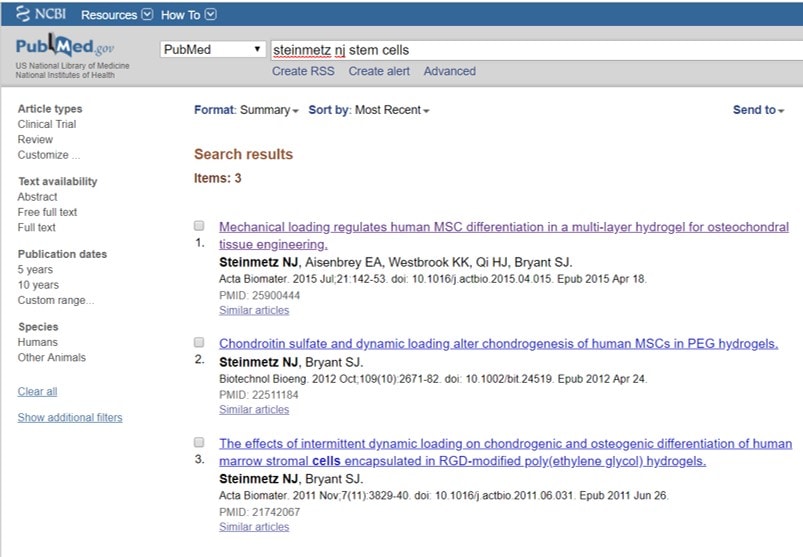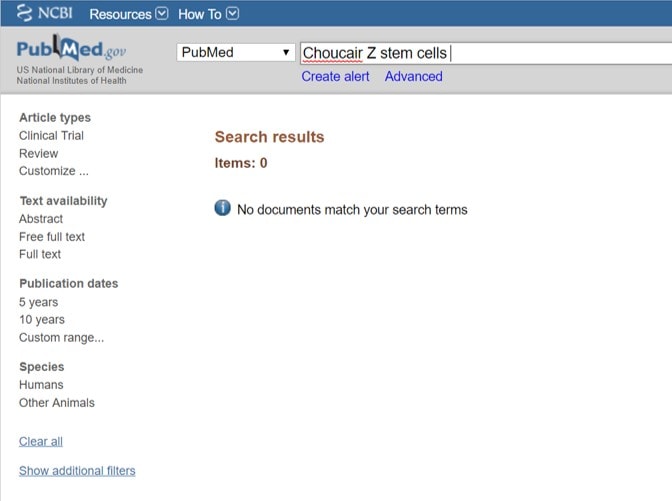Where Are the Scientists at Predictive Biotech?
We have been testing the claims of amniotic and umbilical cord vendors since 2015. Predictive Biotech is a vendor claiming to sell vials of live mesenchymal stem cells, and the company asserts that its science proves its claims. As I’ve already shown, the science to support those claims is lacking. So where are the scientists behind the science? A recent rebuttal from the company will begin our quest for actual stem cell scientists at Predictive.
A Question from My Wife
Last night, my wife asked how I dealt with all of the crazy stuff out there now in the world of stem cells. She was referring to yet another alternative medicine clinic committing fraud by offering dead cells and claiming that they were actually delivering millions of live stem cells. She knew enough that it made her hopping mad. I had a two-word answer: “I blog.” After I thought about it a bit, I also came up with another release mechanism. We perform research to vet the claims.
Testing Amniotic and Umbilical Cord Products
Why spend the money to test these products? Why expose yourself to the brain damage of being attacked by manufacturers who claim that they have live stem cells in their products? Is it all really worth it?
This all began as a way to find a product we could use as a medical network. After all, what if, through some regulatory loophole, there really was a product that contained lots of mesenchymal stem cells from birth tissues? Wouldn’t we, as the world’s largest interventional orthopedics network and a leader in this field for almost two decades, be remiss if we didn’t know this?
After we tested our first batch of products and found no live stem cells, I was personally disappointed and frankly believed that this would be the end of companies claiming that their amniotic and umbilical cord products had live stem cells. Man, was I wrong! If anything, the number of companies making claims of live stem cells exploded.
Over the last year, our initial testing in this area caused several university labs to get involved, namely Cornell and UC Irvine. It was awesome to see that their results mirrored ours and also showed that these are dead cell products and that claims that they contain many live and viable stem cells are not supported by the science. All of that led to the recent consensus statement from physician leaders and academics.
CoreCyte and Predictive Biotech
I’ve blogged several times on Predictive Biotech, a company that makes several birth tissue-related products, including an umbilical cord Wharton’s jelly product called CoreCyte. Several years ago, I found myself in the middle of a true theater-of-the-absurd moment due to CoreCyte’s testing at the University of Utah. Let me explain.
The company has long maintained that its CoreCyte product has many viable mesenchymal stem cells. I was aware of a report that the company had circulated that didn’t make much scientific sense. The author at the University of Utah appeared to suggest that his flow cytometry testing demonstrated about a million mesenchymal stem cells in CoreCyte. Not only was the simple math incorrect, but there was nothing reported that would allow that conclusion. I then became aware of a retraction issued by the scientist at the University of Utah that seemed to show that the conclusions of his report had been altered (the part claiming that the product had many live MSCs). You just can’t make this stuff up.
The Predictive Biotech Response
When we are unable to confirm the claims of many live stem cells in their products, the manufacturers issue rebuttals for their sales reps to use. One of the more recent rebuttals of my blogs being circulated by sales reps was penned by Predictive Biotech, which came out swinging. They attacked me personally, the IOF, and our lab staff. Let me explain.
This rebuttal began with a slew of personal attacks. The company attacked me personally, which I’m used to. However, more upsetting were attacks on my lab staff. Our masters-level lab scientist who was an elite competitive snowboarder in college was painted as a ski bum. The report also concluded that our PhD chief scientific officer wasn’t qualified to perform research in this area. So let’s vet that last claim and compare and contrast to Predictive’s scientific muscle.
Our Lead Scientist—Meet Neven Steinmetz, PhD
Since the Predictive response criticizes our research scientists, what is their street cred in regenerative medicine and stem cells? Let’s focus on our chief scientific officer, Neven Steinmetz, PhD. Neven has a masters in chemical engineering and then a doctorate in chemical and biological engineering from the University of Colorado. She then did post-doctoral work at the University of Glasgow in Scotland. During that post-doc, she published three papers on mesenchymal stem cells:

Since then, our lab has published several papers that benefit everyone in the field. This included a seminal paper on the use of local anesthetics and stem cells. In addition, Dr. Steinmetz and Dustin Berger have published other papers, such as this one that researched tenocyte proliferation as a function of platelet growth factor concentration. In addition, they were involved in collecting and presenting data on whether birth tissue products had living and functional stem cells. They are also still involved in a multi-year study looking at how the knee microenvironment impacts and is predictive of the outcome of bone marrow concentrate procedures. Finally, Neven and Dustin and our lab research team are working on two new papers, one of which is on how to translate cryopreserved stem cell CFUs to fresh, allowing us to maintain a research bank of all bone marrow concentrate treatments.
Predictive Biotech’s Scientists?
I was sent the Predictive Biotech response by a sales rep who stated that it was authored all or in part by Zeinab Choucair, MD, MBA. Who is that? Her LinkedIn page shows that she graduated from a Caribbean medical school and then did what amounted to a transitional internship without a residency. She then got an MBA at Florida International. Her LinkedIn page also reports that she lives in New York, but a NY Medical License Number lookup returned no hits. I then checked Florida, where FIU is located, nothing came up. So it looks like this physician never completed her residency training and is not currently licensed to practice medicine.
Dr. Choucair now lists the Stanford logo on her LinkedIn page along with a very impressive sounding “Stanford Graduate Genetics and Genomics Program.” What is that? This is the first Google hit, an online course in genetics and genomics. What are the prerequisites for that online course?
—5 years of work experience, preferably in science or tech related fields
—Bachelor’s degree or equivalent
—High school level knowledge of biology and chemistry
—An investigative and scientific spirit
Turns out that pretty much anyone can take this course. Frankly, given the lax prerequisite standards, even a business person or sales rep who passed high school science could take the course. So much for that Stanford logo.
Dr. Choucair also lists this on her LinkedIn page: “Regenerative Medicine.” So does she actually have any expertise in regenerative medicine, stem cells, or orthobiologics, like PRP? I next searched the US Library of Medicine under this unique name and stem cells, which returned nothing:

So she has published nothing about stem cells in the peer-reviewed literature. I then searched under PRP, which also returned nothing. Meaning, near as I can tell, Dr. Choucair has no publications in this field at all. So what does a physician who never completed a residency, holds no medical license, and has no publications in orthobiologics know about regenerative medicine? Your guess is as good as mine. She is, however, taking an online course in genetics where the prerequisite is a high school-level knowledge of biology and chemistry.
Hence, suffice it to say that by education, training, and publications, our CSO is an expert in this field, and Dr. Choucair is clearly not.
Other Scientists at Predictive
I then went on LinkedIn and tried to determine what their other scientists had done. First, let’s begin with their laboratory director, Doug Schmid. Does he have a PhD in cell biology, bioengineering, or anything related to stem cells? Nope. His PhD is in physiology? Does he have any publications on stem cells? Nope.
That’s the only PhD that I found who would be capable of directing research working at Predictive Biotech. There’s another working in administration, but he’s been an executive for many years. There are also no physicians who would have any experience in stem cell research.
Specific Issues in the Rebuttal
One of the more bizarre things in this rebuttal is that there isn’t all that much scientific substance. Hence, I will try to filter out the noise and get to the meat of the document. After all, I’m a “get ‘er done” kind of guy.
First, Predictive Biotech claims that its low viabilities in the 40–50% range are due to “processing carryover.” What they seem to mean is that the samples contain much dead debris. Hence, the total live cells are divided by dead cell hits, some of which are dead cells and some of which are debris, which also stains as dead. This is certainly a valid issue, but this brings up Predictive’s second issue, lack of culture testing. More on this below.
I have mentioned that Predictive (and every other company claiming live MSCs) needs to use the ISCT standards (aka FACT), which are explained below in my video:
One critical part is the ability of stem cells to be able to survive long enough to live and thrive in culture. What’s bizarre here is that Predictive Biotech has now adopted these ISCT guidelines as a result of my criticism, but still has yet to present any data to support that it complies with those guidelines. Does just saying it make it so?
The next part of the rebuttal admits that my critique of the University of Utah report was correct. Their simple math was off.
Next predictive goes down another flow cytometry rabbit hole. Why? These companies misusing flow cytometry to try to claim MSC content in their products love to point to the use of one or two markers as identifying a mesenchymal stem cell. In fact, there are many markers that need to be present and absent, see below for my video that explains this issue:
That’s about it when it comes to anything scientifically meaningful in the Predictive Biotech rebuttal.
The upshot? While the Predictive Biotech rebuttal doesn’t make much scientific sense and includes lots of personal attacks on myself (which I’ve become pretty used to over the years), what I wanted to really correct here was the attack on our lab science team. At the end of the day, our CSO actually has actual street cred in the world of stem cell research. Predictive’s team? Not as far as I can tell.
If you have questions or comments about this blog post, please email us at [email protected]
NOTE: This blog post provides general information to help the reader better understand regenerative medicine, musculoskeletal health, and related subjects. All content provided in this blog, website, or any linked materials, including text, graphics, images, patient profiles, outcomes, and information, are not intended and should not be considered or used as a substitute for medical advice, diagnosis, or treatment. Please always consult with a professional and certified healthcare provider to discuss if a treatment is right for you.